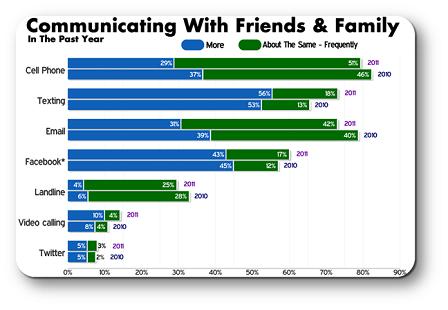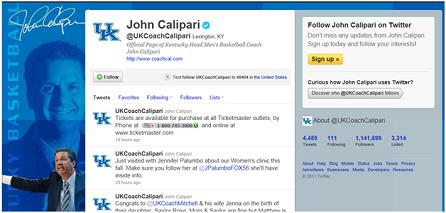In ongoing conversations with broadcasters about the need to ensure their content is available on the myriad digital channels, I am often confronted with the same types of questions.
“We’re short-staffed – do we have to get involved with all these new platforms?”
“How can we monetize these new sources?”
“If the whole world is on Facebook, isn’t Twitter a waste of time?”
“People will always listen to us via our broadcast channels, so do we need to invest in these new digital avenues?”
Of course, these are questions that none of us might have imagined just a decade ago.
But things change – and since 9/11, in particular, they’ve changed rapidly. The entire way in which we connect with family and friends has been forever altered. You can see this in our Techsurvey 7 when we asked our 20,700+ respondents which of the following tools and conduits they’ve started using more in the past year.
 Focus on the blue bars because those “more” responses for Facebook, texting, cell phones, and yes, email are reminders that intrapersonal communication has been revolutionized. But the green bars – “About the same – frequently” – are important, too. Add them up and you can clearly see how communication habits have changed since the days when we typed letters, faxed memos, and picked up a landline phone.
Focus on the blue bars because those “more” responses for Facebook, texting, cell phones, and yes, email are reminders that intrapersonal communication has been revolutionized. But the green bars – “About the same – frequently” – are important, too. Add them up and you can clearly see how communication habits have changed since the days when we typed letters, faxed memos, and picked up a landline phone.
So shouldn’t the way you connect with your core audience (and clients) be seriously re-evaluated at all levels of your company, too? If you’re not where they are, they will go elsewhere to be entertained, informed, and engaged.
Consider this piece of advice:
“If you’re not on Facebook or Twitter, you may be a step behind.”
That quote isn’t from a radio program director but from Evan Daniels, the basketball recruiting analyst for Scout.com.
The sports world is going through many of these same changes that we’re experiencing in radio, especially on the college football level where harried coaches are having to learn new tricks and techniques in order to connect with desirable high school athletes.
And as The New York Times reports, many coaches are struggling to adjust to the new ways to connect with their MVPs – high school kids – most of whom are not interested in talking on the phone. Instead, you reach them on Facebook, Twitter, or text.
The coach who refuses to play in the social media pool – or even delegates it to other staffers – is clearly at a deficit. Dennis Erickson, now with Arizona State, has had to take a crash course in order to get a grip on the digital toolkit, noting that’s “the way to communicate with players.” Kentucky’s basketball coach, John Calipari, is on the opposite end of the spectrum.
In radio, these digital channels present an unprecedented way to communicate with listeners, core fans, and with those who could become brand advocates for your station. It is no longer just about finding diary keepers or meter carriers. It is about understanding that communication runs both ways, and your audience has a voice of their own that needs to be heard.
If you take the time to connect with them where they now live, your station will be on the way to better brand connections, a larger footprint in digital, and the ability to tap into your audience’s communities.
Whether you’re a CEO or a DJ, there’s no longer any room for holdouts.
- Like A Pair Of Old Jeans - April 2, 2025
- What’s Fair Is Fair - April 1, 2025
- What’s On Your Bucket List? - March 31, 2025





Hi Fred, You win for best quote of the week:
“The coach who refuses to play in the social media pool – or even delegates it to other staffers – is clearly at a deficit.”
That’s the bottom line. Thank you for a great read.
Thanks, Lori. The NYTimes article was a great conversation starter that had logical ties to the challenges we face in radio in our efforts to integrate some long-time employees and managers into the social space.
Good thoughts Fred. I wonder how many stations shy away from Social Media because of the fear of making a mistake, or the fear of opening themselves up to visible criticism. But as Seth Godin has said, “If your goal is to try something new while taking failure out of the equation, then nothing remarkable will happen. The status quo will prevail.” And I believe that is something we all have to get over. How else will we learn? How else will we be remarkable.?
Greg, you are spot-on. Mistakes with a radio station can be devastating – hiring the wrong morning show, overreaacting to the competition, choosing the wrong format. But in social media, a campaign that only elicits a dozen comments is an opportunity to learn, move on, and try something else. This is the second inning for social media – a time to experiment and learn. Thanks for reading our blog and for reminding us of the low cost of experimentation.